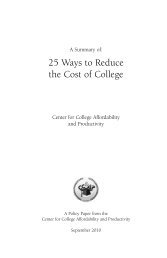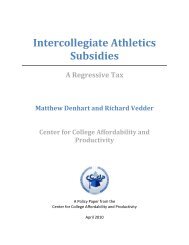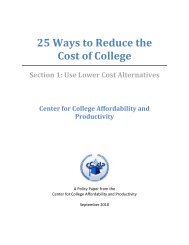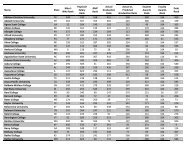Twelve Inconvenient Truths About Higher Education - The Center for ...
Twelve Inconvenient Truths About Higher Education - The Center for ...
Twelve Inconvenient Truths About Higher Education - The Center for ...
Create successful ePaper yourself
Turn your PDF publications into a flip-book with our unique Google optimized e-Paper software.
TWELVE INCONVENIENT TRUTHS ABOUT HIGHER EDUCATION<br />
researchers investigate all sorts of obscure phenomena, it is noteworthy that little or no work is done calculating<br />
the marginal learning and other effects of each year of college. Does the third year add as much<br />
to a student’s critical thinking skills, maturity, knowledge, leadership qualities, etc., as the second year?<br />
How does the fourth year compare with the third?<br />
Two further points. It is true that the federal data on graduation rates are skewed by significant problems,<br />
including, <strong>for</strong> example, a failure to trace transfer students. But also it is true that the long time to graduation<br />
problem is not confined to undergraduates. Arguably the biggest scandal in higher education is the fact that<br />
in many disciplines, such as the humanities, it takes on average about eight years to complete a Ph.D. It did<br />
not use to be that way (I completed my Ph.D. in less than three years in the 1960s), and almost certainly there<br />
is enormous waste of resources with the way we conduct graduate education in the United States.<br />
<strong>Inconvenient</strong> Truth #7:<br />
Colleges Hide Vital In<strong>for</strong>mation from Consumers<br />
Did Michigan State University (MSU) have a good year in 2011? Who knows? Do we know whether<br />
its seniors have more knowledge of basic facts than its freshmen? Do we know whether critical<br />
thinking skills improved in the years at Michigan State? Do we know how many hours students were<br />
engaged in academic pursuits or partying, or even whether they liked their experience at MSU? Do we<br />
have any idea what the typical earnings of a MSU graduate are five years after graduation? How do they<br />
compare with peer Big Ten institutions like the University of Michigan or Indiana University? <strong>The</strong>se are<br />
things that those financing the operations of MSU, and particularly its prospective students and their<br />
families, would benefit from knowing.<br />
<strong>The</strong>re is an abysmal lack of transparency in higher education. We have good test instruments that can<br />
help answer several of the questions above, and the IRS or Social Security Administration could tell us<br />
about earnings of graduates but do not. Hence the “bottom line” is often determined by magazine rankings,<br />
which are arbitrary and depend much on the amount and quality of the inputs used. It is the equivalent<br />
of evaluating restaurant quality by the price paid <strong>for</strong> the food used, rather than by how customers<br />
enjoy the experience. Moreover, the best school <strong>for</strong> one student, given her tastes, academic aptitude,<br />
financial condition, and so <strong>for</strong>th, may not be the best school <strong>for</strong> others.<br />
Often college and university trustees do not get accurate in<strong>for</strong>mation on campus issues. Was Professor<br />
X’s firing <strong>for</strong> allegedly questionable conduct justified, or was he a really a courageous whistleblower<br />
trying to curb dubious campus behavior? What is the salary of the football coach relative to the college<br />
president? What percent of the budget goes <strong>for</strong> direct instruction as opposed to student services, administration,<br />
campus maintenance, and so <strong>for</strong>th?<br />
<strong>The</strong> lack of in<strong>for</strong>mation impedes good decision-making. In the traditional <strong>for</strong>-profit private sector,<br />
the powerful bottom line of profits is an in<strong>for</strong>mational device that propels all sorts of decisions, rein<strong>for</strong>ced<br />
by an incentive system that rewards good per<strong>for</strong>mance and punishes poor outcomes. But how can<br />
a Provost or Dean decide whether to use scarce resources to expand the accounting department or English<br />
department? He or she knows enrollment data <strong>for</strong> each unit, and personnel costs, but does he or she<br />
know what the vocational success rate of accounting graduates is relative to English majors? Does he or<br />
she know which unit is truly per<strong>for</strong>ming first-rate research? Often, the person is largely in the dark, so<br />
oft-times poor resource allocation decisions are made out of ignorance.<br />
8







